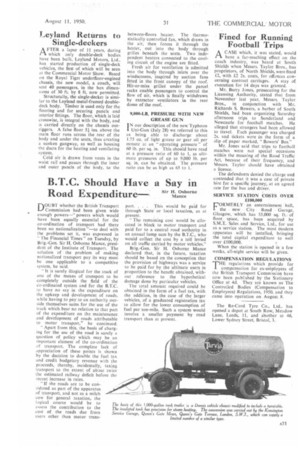B.T.C. Should Have a Say in
Page 33

If you've noticed an error in this article please click here to report it so we can fix it.
Road Expenditure—, Sir FL Osborne
Mance
DOUBT whether the British Transport Commission had been given wide enough powers—" powers which would have been equally essential for the co-ordination of transport had there been no nationalization "—to deal with the problems se( it, was expressed in "The Financial Times" on Tuesday, by Brig.-Gen. Sir H. Osborne Mance, president of the Institute of Transport. The solution of the problem of making nationalized transport pay its way must he one applicable to a competitive system, he said.
" It is surely illogical for the track of one of the means of transport to be completely outside the field of the co-ordinated system and for the I3,T,C. to have no say in the expenditure on the upkeep and development of roads, while having to pay to an authority outside themselves sums for the use of the track which bear no relation to that part of the expenditure on the maintenance and development of roads attributable to motor transport,'" he continued, " Apart from this, the basis of charging for the use of the road is surely a question of policy which may be an important element of the co-ordination of transport. The complete lack of appreciation of these points is shown by the decision to double the fuel tax and credit budgetary revenue with the proceeds, thereby, incidentally, taxing transport to the extent of about twice the estimated railway deficit before the recent increase in rates. port. . . . This would be paid for through State or local taxation, as at present. .
" The remaining cost would be allocated in block to motor transport and paid for to a central road authority in an annual lump sum by the 13.T.C., who• would collect the cost by a toll levied on all traffic carried by motor vehicles."
Brig.-Gen. Sir H. Osborne Mance declared that, in the future, taxation shoutd be based on the conception that the provision of highways was a service to be paid for by the ultituate users in proportion to the benefit obtained, without reference to the hypothetical damage done by particular vehicles.
The total amount required could be obtained in the form of a fuel tax, with the addition, in the case of the larger vehicles, of a graduated registration tax to allow for the lower consumption of fuel per ton-mile. Such a system would involve a smaller payment by road transport than at present












































































